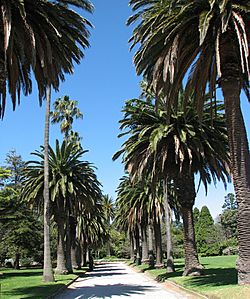St Kilda Botanical Gardens facts for kids
Quick facts for kids St Kilda Botanical Gardens |
|
|---|---|

A palm-lined path in the gardens
|
|
| Type | Public Park |
| Location | St Kilda, Victoria, Australia |
| Area | 6 hectares |
| Operated by | City of Port Phillip |
| Status | Open |
| Connecting transport | Tram, Bus, Car |
| Landmarks | Ornamental pond, Conservatory, Ecocentre, Alister Clarke Rose Garden |
| Facilities | Toilets, Playground |
The St Kilda Botanical Gardens are a wonderful green space located in St Kilda, Victoria, Australia. These gardens officially opened in 1861, but they were first planned in 1859. Before becoming a beautiful park, this area was actually a gravel pit and a place where rubbish was dumped!
Contents
Exploring St Kilda Gardens
The St Kilda Botanical Gardens cover about 6 hectares, which is like the size of six rugby fields! They are a great place to relax, learn about plants, and enjoy nature right in the city. The gardens are looked after by the City of Port Phillip.
Welcoming Gates of the Gardens
In 2010, the gardens celebrated their 150th birthday! To mark this special occasion, four unique new gates were added. These gates were designed by a talented artist and blacksmith named David Wood. You can find them on Tennyson, Dickens, and Herbert Streets, welcoming visitors into the park.
The Alister Clark Rose Garden
One of the special parts of the gardens is the Alister Clark Memorial Rose Garden. It first opened in 1948. Alister Clark was a famous Australian rose breeder, meaning he created many new types of roses. While this garden once had many of his original roses, today you'll mostly see roses from another famous breeder, David Austin. If you want to see a much larger collection of Alister Clark's roses, there's another big garden dedicated to him in Bulla, north of Melbourne.
The Rain Man Fountain
Near the tropical plant conservatory, there's a cool ornamental pond. This pond is home to the "St Kilda Rain Man" fountain. This unique sculpture was created by Corey Thomas and Ken Arnold and was installed in 2005. The Rain Man is special because it's powered by the sun and uses recycled water from the pond below. It's a great example of how art and nature can work together in a sustainable way.
 | Audre Lorde |
 | John Berry Meachum |
 | Ferdinand Lee Barnett |

